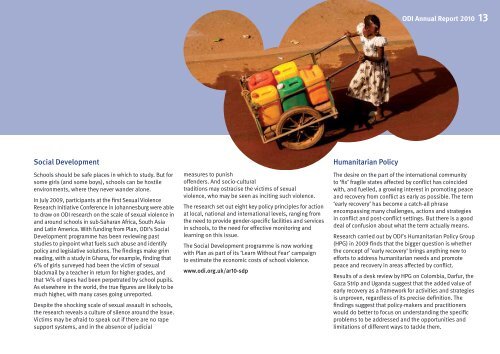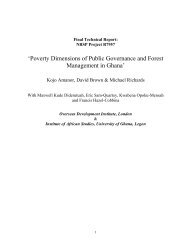ODI Annual Reports - Overseas Development Institute
ODI Annual Reports - Overseas Development Institute
ODI Annual Reports - Overseas Development Institute
You also want an ePaper? Increase the reach of your titles
YUMPU automatically turns print PDFs into web optimized ePapers that Google loves.
<strong>ODI</strong> <strong>Annual</strong> Report 2010 13<br />
Social <strong>Development</strong><br />
Schools should be safe places in which to study. But for<br />
some girls (and some boys), schools can be hostile<br />
environments, where they never wander alone.<br />
In July 2009, participants at the first Sexual Violence<br />
Research Initiative Conference in Johannesburg were able<br />
to draw on <strong>ODI</strong> research on the scale of sexual violence in<br />
and around schools in sub-Saharan Africa, South Asia<br />
and Latin America. With funding from Plan, <strong>ODI</strong>’s Social<br />
<strong>Development</strong> programme has been reviewing past<br />
studies to pinpoint what fuels such abuse and identify<br />
policy and legislative solutions. The findings make grim<br />
reading, with a study in Ghana, for example, finding that<br />
6% of girls surveyed had been the victim of sexual<br />
blackmail by a teacher in return for higher grades, and<br />
that 14% of rapes had been perpetrated by school pupils.<br />
As elsewhere in the world, the true figures are likely to be<br />
much higher, with many cases going unreported.<br />
Despite the shocking scale of sexual assault in schools,<br />
the research reveals a culture of silence around the issue.<br />
Victims may be afraid to speak out if there are no rape<br />
support systems, and in the absence of judicial<br />
measures to punish<br />
offenders. And socio-cultural<br />
traditions may ostracise the victims of sexual<br />
violence, who may be seen as inciting such violence.<br />
The research set out eight key policy principles for action<br />
at local, national and international levels, ranging from<br />
the need to provide gender-specific facilities and services<br />
in schools, to the need for effective monitoring and<br />
learning on this issue.<br />
The Social <strong>Development</strong> programme is now working<br />
with Plan as part of its ‘Learn Without Fear’ campaign<br />
to estimate the economic costs of school violence.<br />
www.odi.org.uk/ar10-sdp<br />
Humanitarian Policy<br />
The desire on the part of the international community<br />
to ‘fix’ fragile states affected by conflict has coincided<br />
with, and fuelled, a growing interest in promoting peace<br />
and recovery from conflict as early as possible. The term<br />
‘early recovery’ has become a catch-all phrase<br />
encompassing many challenges, actions and strategies<br />
in conflict and post-conflict settings. But there is a good<br />
deal of confusion about what the term actually means.<br />
Research carried out by <strong>ODI</strong>’s Humanitarian Policy Group<br />
(HPG) in 2009 finds that the bigger question is whether<br />
the concept of ‘early recovery’ brings anything new to<br />
efforts to address humanitarian needs and promote<br />
peace and recovery in areas affected by conflict.<br />
Results of a desk review by HPG on Colombia, Darfur, the<br />
Gaza Strip and Uganda suggest that the added value of<br />
early recovery as a framework for activities and strategies<br />
is unproven, regardless of its precise definition. The<br />
findings suggest that policy-makers and practitioners<br />
would do better to focus on understanding the specific<br />
problems to be addressed and the opportunities and<br />
limitations of different ways to tackle them.

















